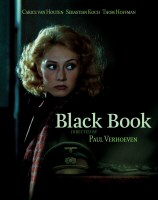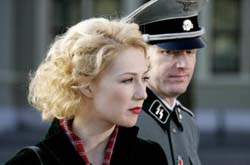
Director Paul Verhoeven is better known for Holywood blockbuster movies such as RoboCop, Total Recall and Basic Instinct. Returning to make a film in his native Netherlands for the first time in 20 years, Black Book (Zwartboek) picks up the story of a young Jewish woman hiding in a Christian family’s house in September 1944, near the end of World War II. (Forced to recite New Testament verses before being served any food, it’s not the best of hiding places.)
Rachel Steinn’s journey to the Hague begins when a bomb destroys the family’s home. A local Dutch policeman helps her to escape by boat along with the rest of her family to safety in the south of the country. But it’s a trap, and the German’s attack, killing all but Rachel. Shivering in the cold water, she is rescued by locals and is transported in a coffin in the back of a hearse to a resistance group based in an undertakers.
Now wth a change of hair colour and using the name Ellis de Vries, she becomes more involved in resistance missions, ending up befriending the Gestapo chief Ludwig Müntze, a keen stamp collector!
It’s good to sea that last year’s run of films with torture scenes has continued into this year: Casino Royale, Pan’s Labyrinth, The Last King of Scotland, Black Book. Is it possible to distribute a film without attempting to torture the cast?

Getting a job as Müntze’s secretary, she places a bug in his office, but also witnesses his softer side, and falls in love. He’s convinced that the war is nearly over, and is working to negotiate a ceasefire with the resistance movement to limit needless deaths. It’s also in Müntze’s office that she gets to know Ronnie, a fun-loving girl who is similarly working and sleeping with the German officers.
With every escape and operation foiled, there is clearly a mole in the resistance. The spotlight even turns on Rachel, who ends up incarcerated alongside Müntze who has been accused of treason. As the war ends, Ronnie arranges for Rachel and Müntze’s rescue, and they flee The Hague to live on a house boar! But the chase and the journey isn’t over. She’s still under suspicion ...
The film starts in 1956 with a clip of Ronnie and her Canadian husband on a bus tour, stopping off at a kibbutz in Israel. She unexpectedly finds Rachel teaching in the classroom, delighted to be reunited after more than ten years.
Yet the final moments of the film are a reminder that strife hasn’t been completely eliminated from Rachel’s life. There are explosions, soldiers and so the cycle begins again with the start of the Suez Crisis.
At time, it feels like Black Book will never stop ... it’s a mammoth two and a half hour. And like any good thriller, there are endless twists and turns, leading cast and audience to jump to the wrong conclusions about people’s motives and decisions. War is complicated, and while history portrays winners and losers, reality defines light in many quarters (even if accompanied by great evil).
Although I’d read some good reviews, I didn’t expect to enjoy it so much. It has a touch of the Basic Instinct about it (including a reference to that moment). Verhoeven stated in an interview with the Guardian:
“Of course there are nude scenes, I'm Dutch!”
And the Dutch influence extends to the English credits which include reference to the “Stand Inns”!
If you're quick, you'll catch it in the Queen's Film Theatre each night for the next week.
No comments:
Post a Comment